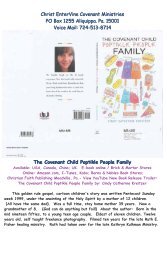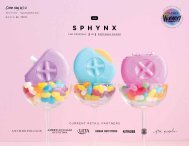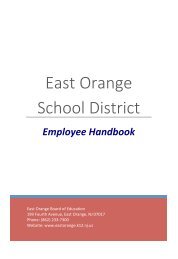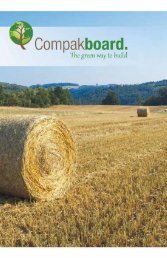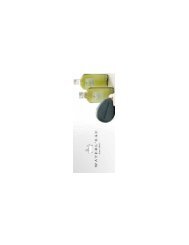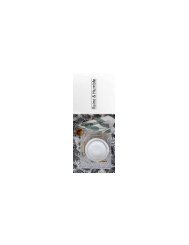Ref
Create successful ePaper yourself
Turn your PDF publications into a flip-book with our unique Google optimized e-Paper software.
Sustainable<br />
Living Guide<br />
INFORMATION & TIPS
Table of Contents<br />
ENERGY In Your Room<br />
WATER In the Laundry Room & Bathroom<br />
WASTE In the Trash Room<br />
HOSPITALITY On Your Plate<br />
TRANSPORTATION On the Go<br />
COLISEUM On Game Day<br />
CAMPUS In the Classroom<br />
1<br />
2<br />
3<br />
4<br />
5<br />
6<br />
7
In Your<br />
Room<br />
Want to be more sustainable?<br />
The best place to start is in your<br />
room. There are many things you<br />
can do to decrease your energy<br />
usage and lower your environmental<br />
footprint while living in sunny,<br />
Southern California. Your room is<br />
your space, so let’s get personal!<br />
ELECTRICITY USAGE<br />
USC Housing residents use about 16.2 million<br />
kWh of electricity each year – with energy<br />
equivalent to the fuel it would take to:<br />
• Drive around the equator 1,100 times<br />
• Cook breakfast for the populations<br />
of California and Texas<br />
• Wash 194 million pounds of laundry<br />
FLUOR TOWER ENERGY BREAKDOWN<br />
Other<br />
water heating,<br />
microwave,<br />
other kitchen<br />
How much energy do some of the<br />
most common residence hall<br />
appliances use?<br />
Microwave (active) = 1,500 watts<br />
TV (active) = 339 watts<br />
Mini fridge = 33 watts<br />
Laptop (active) = 25 watts<br />
Printer (active) = 15 watts<br />
Phone charger (charging) = 2.6 watts<br />
Plug Load<br />
Lighting<br />
12.1%<br />
28.3%<br />
8.1%<br />
51.5%<br />
Heating and<br />
Cooling<br />
TIPS & ACTIONS<br />
1. USE NATURAL LIGHTING DURING THE DAY<br />
Open those blinds and use natural lighting during the day. When you do<br />
need to turn on lights, use desk lamps instead of overhead lamps. This is<br />
called “task lighting.” Not only does task lighting use less energy, it also<br />
increases productivity.<br />
2. ADJUST TEMPERATURES SEASONALLY<br />
Adjust your heating and cooling to better align with outdoor temperatures<br />
(68° in the winter and 78° in the summer). Better yet, dress for the weather<br />
and wear a jacket in the winter and lighter fabrics in the summer to<br />
avoid turning on heating or cooling altogether.<br />
3. USE CFLS & LEDS<br />
Replace the incandescent bulb in your desk lamp with a more energy<br />
efficient option like a CFL or LED. These bulbs use half as much electricity<br />
as an incandescent bulb AND last 10-15 times longer.<br />
4. UNPLUG ELECTRONICS<br />
Did you know that your electronics use energy<br />
when they’re plugged in, even if they aren’t<br />
on? This is called “vampire power”. Cut down<br />
on vampire power by unplugging your<br />
electronics when they aren’t in use.<br />
Purchase an area rug for your room. Not only<br />
will it look good, it’ll add warmth underfoot<br />
meaning you’ll be less likely to turn on the heat.<br />
1
In the Laundry<br />
Room & Bathroom<br />
Next stop on our sustainability tour? The laundry room and bathroom!<br />
These two areas are resource hogs, consuming both water and energy. Let’s get<br />
started, so you can green up while you clean-up.<br />
WATER USAGE<br />
Housing residents use approximately 68 million<br />
gallons of water a year, that’s enough water to:<br />
• Fill 2,300 backyard pools<br />
• Cover the Coliseum in 11 feet of water<br />
ENERGY FOR HEATING WATER<br />
Not only is water used in the bathroom, energy is also used to heat<br />
water. It takes 1.7 kWh of electricity for a 7 minute shower. This is<br />
enough electricity to power a lightbulb for 14 hours.<br />
WATER SAVED BY TAKING SHORTER SHOWERS<br />
You will save 5,500 gallons of water a year by taking a 5 minute<br />
shower. If all USC Housing residents did this, we would save 35.5<br />
million gallons of water a year - enough to do laundry for the entire<br />
state of Nebraska. H 2<br />
WOAH!<br />
TIPS & ACTIONS<br />
Laundry Room<br />
1. ONLY WASH FULL LOADS OF LAUNDRY<br />
Get the most out of your wash by only washing full loads of laundry. If<br />
you only have enough laundry for a half-load, offer to share the wash<br />
with a friend.<br />
2. USE COLD WATER<br />
It takes energy to heat water, so try using cold water to wash your<br />
clothes. Check out ‘Numbers’ above for more information about the<br />
amount of energy needed to heat water.<br />
Avoid microbeads - those tiny plastic particles in your<br />
personal care products. Instead, choose cosmetics<br />
with natural ingredients like walnut shells or sugar.<br />
Bathroom<br />
3. TURN OFF FAUCET<br />
Shaving? Washing your face? Brushing your teeth?<br />
Turn off the faucet when you aren’t actively using it.<br />
4. TAKE SHORTER SHOWERS<br />
We love showers just as much as you, but cutting<br />
your shower time by 2 minutes every day can save<br />
28 gallons a week.<br />
5. REPORT LEAKS TO MAINTENANCE<br />
A small faucet leak can waste up to 20 gallons a<br />
day. Report leaks to Housing Maintenance by<br />
submitting a work order at hsmtma.usc.edu.<br />
6. USE ECO-FRIENDLY PRODUCTS<br />
Many personal care products contain potentially<br />
harmful ingredients. Skip the sulfates and buy<br />
natural alternatives. Your body and the environment<br />
will thank you!<br />
2
In the<br />
Trash Room<br />
Did you know that USC has a goal of 75%<br />
waste diversion by 2020? Meaning 75% of campus<br />
waste will be donated, reused, recycled, or composted<br />
instead of being sent to a landfill.<br />
TIPS & ACTIONS<br />
1. REDUCE, REUSE, RECYCLE<br />
This clever alliteration is the most important rule to consider when it<br />
comes to diverting materials from landfills.<br />
Reduce<br />
First, reduce what you<br />
purchase. Before buying<br />
something think, “do I really<br />
need that?”<br />
HYDRATION STATIONS<br />
There are 71 hydration stations<br />
throughout USC residence halls. These<br />
hydration stations prevent the disposal<br />
of over 850,000 plastic bottles a year.<br />
There are also 8 refillable bottle stations<br />
throughout campus.<br />
USC ANNUAL WASTE GENERATION<br />
USC generates 11,000 tons of waste<br />
annually - that weighs as much as 52<br />
blue whales. Luckily, 53.5% of this<br />
waste is recycled.<br />
What does the average household<br />
waste stream look like?<br />
27% Paper<br />
15% Food<br />
14% Yard Trimmings<br />
13% Plastics<br />
9% Metals<br />
9% Rubber/Leather/Textiles<br />
6% Wood<br />
5% Glass<br />
3% Other<br />
Reuse<br />
Secondly, reuse what you<br />
have. Find a second life<br />
for something you would<br />
normally throw away.<br />
Recycle<br />
Thirdly, if you do need to get<br />
rid of something, recycle it.<br />
Recycling reduces waste sent<br />
to landfills, saves energy, and<br />
conserves natural resources.<br />
2. FAMILIARIZE YOURSELF WITH RECYCLING AND<br />
COMPOSTING PRACTICES ON CAMPUS<br />
Recycling and composting practices vary from city to city and state<br />
to state. To learn more about composting and recycling, take a look at<br />
USC’s recycling guidelines at housing.usc.edu/index.php/sustainability<br />
3. PURCHASE REUSABLE GOODS<br />
Purchasing reusable goods, such as bags, water bottles, and flatware,<br />
decreases the need for single-use items that will end up in a landfill.<br />
4. SHARE, DONATE, OR SELL<br />
Got something that you no longer want but still<br />
has a usable life? Find someone else who can use it.<br />
Try any of the following methods: donate to a<br />
thrift shop, join a clothes swap program, visit<br />
the flea market, or sell it online.<br />
Keep your reusable bags in your car or backpack to<br />
make sure you never forget them while shopping!<br />
3
On Your<br />
Plate<br />
Changing your diet is one of the more significant ways you can<br />
decrease your overall environmental impact due to all of the<br />
land, water, and energy it takes to grow our food. With that in<br />
mind, USC has a 14-point food philosophy that can help guide you<br />
on your way to making environmentally friendly food choices.<br />
TIPS & ACTIONS<br />
1. CHOOSE LOCAL, ORGANIC, AND SEASONAL FOODS<br />
Local foods cut down on food-miles traveled; organic foods are grown<br />
without harmful pesticides; and seasonal foods are fresher and packed<br />
with more nutrients. Check labels at the dining halls to find local foods.<br />
2. FOCUS ON MINIMALLY-PROCESSED FOODS<br />
Processed foods are higher in fat, sugar, and salt. Plus, they require more<br />
energy to produce and more packaging for transport. Help your body<br />
and the environment by choosing minimally processed foods –which<br />
can be found in the dining halls and in many restaurants on campus.<br />
3. ONLY TAKE WHAT YOU KNOW YOU WILL EAT<br />
Reduce food waste by taking appropriate portion sizes. Still hungry?<br />
You can always go back for seconds, or thirds, or fourths…<br />
4. THINK “PRODUCE FIRST” TO EAT LOWER<br />
ON THE FOOD CHAIN<br />
Eating a plant-based diet saves energy and water, and cuts down on<br />
carbon dioxide emissions. If eating more vegetables intimidates you,<br />
you can start small by eating chicken instead of red meat once a week.<br />
PLANTS IN THE USC<br />
TEACHING GARDEN<br />
Two on-campus urban farms<br />
produce 3,520 plants. Using<br />
aeroponic technology, these plants<br />
use 90% less water than traditional<br />
farming. Look out for these greens<br />
on the menu at EVK and the<br />
restaurants of USC.<br />
SUSTAINABILITY<br />
2020 GOAL<br />
USC has a goal to purchase 20%<br />
of food from sustainable sources<br />
by 2020.<br />
WASTE FROM NEKTAR<br />
“0” – the amount of waste sent<br />
to landfill from Nektar. The pulp<br />
and fruit skins from Nekter go into<br />
the vermiculture bin (a.k.a. worm<br />
composting) at the community<br />
garden behind Parkside, making<br />
Nekter an almost zero waste facility.<br />
Questions about dining on campus?<br />
Contact Lindsey Pine, USC’s Registered<br />
Dietitian at lpine@usc.edu or 213.740.9901.<br />
Lettuce, tomatoes, and beets OH MY!<br />
Check out the Trojan Farmers Market,<br />
every Wednesday from 11AM - 3PM at<br />
McCarthy Quad.
On The<br />
Go<br />
TRANSPORTATION<br />
Beep, beep, there goes the bus!<br />
Did you know that transportation<br />
accounts for 26% of U.S. greenhouse<br />
gas emissions? Cut down on these<br />
emissions by utilizing sustainable<br />
modes of transportation. Thankfully,<br />
being a USC student makes this easy.<br />
Leave your car at home, USC Transportation has you covered. Partnerships<br />
with ZipCar, Enterprise, and Uber make it easy to get access to a vehicle.<br />
TIPS & ACTIONS<br />
1. WALK OR BIKE<br />
Best way to reduce your transportation emissions? Walk or bike to<br />
your destination. Help the environment and burn some calories at the<br />
same time.<br />
2. USE PUBLIC TRANSIT<br />
USC buses, Campus Cruiser, the Metro, LA DOT, there are so many<br />
ways to get around without a car! With the Expo Line, you can go from<br />
campus to Santa Monica beach in 35 minutes.<br />
3. USE UBER OR CAMPUS CRUISER<br />
Need a ride home late at night? Get a free ride with Uber or Campus<br />
Cruiser - covered by USC Transportation. P.S. Campus Cruiser vehicles<br />
have bike racks, so you can ride your bike during the day knowing you<br />
don’t have to ride home at night.<br />
4. CARPOOL<br />
Driving? Take a friend. Take two friends. The more the merrier when it<br />
comes to carpooling. USC’s own Zimride community can help set you up.<br />
5. TRAVEL LIGHTLY<br />
While it might be tempting to take 5 gameday outfit options for the<br />
Weekender in San Francisco, choose only 1 instead. The lighter you<br />
pack, the less fuel you use while traveling.<br />
USC BUS ROUTES<br />
With 11 different bus routes throughout USC campuses,<br />
you’re sure to be able to get where you need to go.<br />
HIERARCHY OF CO 2<br />
EMISSIONS<br />
Trying to take the most carbon efficient form of transportation?<br />
See below for a hierarchy of emissions per<br />
mile for various forms of transit (listed in order of most<br />
efficient to least efficient).<br />
1. Bus<br />
2. Hybrid Car<br />
3. Electric Rail<br />
4. Efficient Car<br />
5. Diesel Rail<br />
6. Typical Car<br />
7. Typical SUV
On Game<br />
Day<br />
COLISEUM<br />
Game day. Where Trojans take titles, and you<br />
take time to conserve natural resources, decrease<br />
carbon emissions, and lower your environmental<br />
footprint. Okay, maybe that’s not your main focus,<br />
but that doesn’t mean it can’t be part of game day.<br />
TIPS & ACTIONS<br />
1. KNOW GAME DAY ZERO WASTE PROCEDURES<br />
The Los Angeles Memorial Coliseum implemented a Zero Waste program<br />
at the stadium prior to the 2015 football season that strives to divert 90%<br />
or more of waste materials generated on game day from the landfill. You<br />
can help the Coliseum achieve this zero waste goal by placing your waste<br />
into the proper bin (Recycle or Compost). If you have any questions, just<br />
look for the signage around the stadium to help you make the right choice!<br />
2. WALK TO TAILGATES & GAMES<br />
Seems obvious, right? You’d be surprised… we’ve heard of students<br />
Ubering to the Coliseum…<br />
PLASTIC BOTTLE<br />
RECYCLING<br />
Americans recycle 32% of<br />
plastic bottles.<br />
Help increase this number<br />
by placing plastic bottles in<br />
blue recycling bins.<br />
3. BUY FOOD & DRINK IN BULK<br />
Hamburgers? Hot dogs? Veggie dogs? Buying in bulk minimizes packaging,<br />
so grab that friend with a Costco card and get shopping.<br />
AVERAGE USC<br />
FOOTBALL GAME<br />
ATTENDANCE<br />
An average of 73,272 fans<br />
show up at the Coliseum for<br />
USC football games.<br />
Make your tailgate sustainable by grilling<br />
up turkey burgers instead of hamburgers!
In The<br />
Classroom<br />
CAMPUS<br />
As a student at the<br />
University of Southern<br />
California, your primary<br />
job is to learn. Learn from<br />
your professors, learn from<br />
your peers, learn from<br />
yourself. Start learning<br />
how to be a sustainable<br />
student by reading the<br />
tips and actions below.<br />
PAPER COMES<br />
FROM TREES<br />
One tree provides roughly 8,333<br />
sheets of paper. Replacing<br />
1 ton of virgin paper with 1 ton<br />
of 50% post-consumer content<br />
paper saves 12 trees.<br />
NUMBER OF<br />
SUSTAINABILITY<br />
RELATED<br />
MAJORS AND<br />
MINORS<br />
There are currently<br />
7 sustainability<br />
related majors<br />
and<br />
7 sustainability<br />
related minors.<br />
TIPS & ACTIONS<br />
1. THINK BEFORE YOU PRINT<br />
Consider natural resources and think before you print. If you do need to<br />
print, consider printing double-sided, single spaced with small margins, or<br />
printing multiple pages on the same piece of paper.<br />
2. TAKE NOTES DIGITALLY<br />
If you already own a laptop or tablet, try using it to takes notes. Not only<br />
will you save paper, you won’t ever have to worry about losing your notes –<br />
just make sure you don’t lose your laptop!<br />
3. TAKE A SUSTAINABILITY RELATED COURSE<br />
With numerous majors and minors with an environmental focus,<br />
sustainability related courses are easy to find here at USC. Plus, because<br />
sustainability is so interdisciplinary any student can find a class to take,<br />
regardless of major.<br />
Take a trip with your friends to The USC<br />
Wrigley Institute for Environmental<br />
Studies on Catalina Island. The center<br />
welcomes public visitors throughout<br />
the year, just call (310) 510-0811 and<br />
book an appointment.<br />
7
620 McCarthy Way<br />
Los Angeles, CA<br />
90089-1332<br />
Phone: (213) 740-2546<br />
Fax: (213) 740-8488<br />
E-Mail: housing@usc.edu<br />
housing.usc.edu<br />
Erin Fabris, Sustainabilty Coordinator<br />
E-mail: greenhousing@usc.edu








